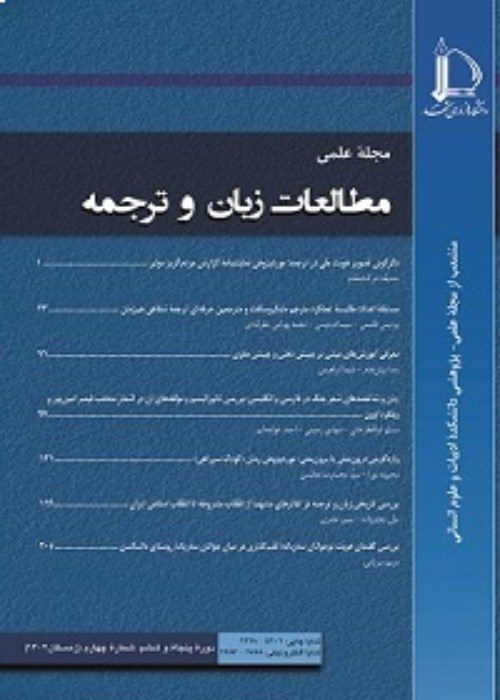Humor and Pun: Investigating the Problems of Iranian Junior Students of English in Comprehending Pun Jokes
Author(s):
Article Type:
Research/Original Article (دارای رتبه معتبر)
Abstract:
Introduction
The pun refers to the similarity of two or more words in the morphemes with different meanings. The pun, which is used more than other kinds of humor, can be found in not only words but also idioms. Puns that are categorized as language jokes are considered humorous as a result of being dependent on different meanings. Beside the musical richness that puns add to words, pun jokes could be means of improving learners' interest and ability level and creating a fun atmosphere in classrooms. To benefit from the positive implications of using puns in classrooms it is important to make sure that learners have sufficient knowledge of puns and their different meanings. Considering the paucity of research regarding learners' comprehension of pun jokes in Iran, the present research has made an attempt to fill the gap to some extent.Over the years, translatability of puns has been studied by different researchers. Translatability of puns has been studied by Qafzezi (2013) in the translation of Alice in Wonderland. The findings showed that Albanian translators in Qafzezi's study (2013) had a lot of problems in translating puns. Perez (2008) studied the same issue in the translation of Spanish film titles. He found that sometimes the difficulty of pun translations forced the translators to omit the puns totally and provide a different translation. Saadi's Golestan and the translation of puns in Saadi's Golestan was investigated by OliaeeNia and Ordoodari (2006). The results showed that, despite having some methods for translating puns, sometimes it is not possible to translate them.Although puns and their translatability have been the main focus of many studies, it seems that pun jokes are not studied enough. This is what Laurian (1992) believes and Popa (2005) thinks puns' magical structure is the reason for lack of studies in the areas of pun humors and translation. Lems (2013) considers English to be a rich language in the case of puns and since Persian has the same situation, using English pun jokes in Iran's English language classes can have positive influences on learning. Furthermore, Kilgore (1994) believes that the requisite for benefiting from the positive effects of pun jokes on learning is that learners should reach a high level of understanding of such jokes.
Methodology
Twenty-one Iranian undergraduate students participated in this study. Among these students, who were 19 to 24 years old, 12 were the students of English Translation and 9 were the students of English Literature. These students were asked to take part in a test with 12 pun jokes. All of the jokes were in English and each contained a pun. The participants were asked to read the jokes and then translate the pun sentence which was underlined in each joke. The participants were also allowed to look up the words they did not know in a dictionary in order to make sure that they would not skip any joke only because the words were new to them.Subsequently, the participants answered a question, the purpose of which was to realize whether they had understood the humor of the joke or not. The question was "why was the joke funny?" A proper answer to this question was the criterion to participants' understanding. Participants' responses to each joke were studied and the results were portrayed on a number of graphs.Discussion
The results showed that most of the participants were not successful in translating the puns. In some cases, some of them could not even recognize which word was humorous, and believed that the joke was not funny at all. The participants of this study did not show enough mastery of pun words in English, either in recognizing or arriving at their meanings. As a result, they could not have a proper translation. In some cases, the translations were acceptable but the answer provided for the question showed that the participants were not successful in understanding the humor. In other words, the ability to understand the joke fully depended on recognizing the pun and its different meanings.Conclusions
Since the main problem was with the participants and their lack of knowledge in recognizing the puns, to improve the situation, it is better to start with instructional programs enriched with pun humors and use teachers and masters who are interested in carrying out such programs. It can also be a good idea to encourage participants themselves to enrich their process of English learning by using humor books or joke websites. Since jokes can create a friendly and funny atmosphere for learning, it can be implemented to ease the process of learning and be a kind of help for learners.There are some suggestions for further research. Firstly, the effect of teaching humor in English classrooms in Iran on learners' level of interest and participation in learning can be investigated. Another study can focus on whether Iranian English learners learn vocabulary better if humor becomes the tool of instruction. Finally, the relation between Iranian learners' rate of learning and use of humor in English language classes can be studiesKeywords:
Language:
Persian
Published:
Language and Translation Studies, Volume:50 Issue: 3, 2017
Pages:
1 to 27
magiran.com/p1885453
دانلود و مطالعه متن این مقاله با یکی از روشهای زیر امکان پذیر است:
اشتراک شخصی
با عضویت و پرداخت آنلاین حق اشتراک یکساله به مبلغ 1,390,000ريال میتوانید 70 عنوان مطلب دانلود کنید!
اشتراک سازمانی
به کتابخانه دانشگاه یا محل کار خود پیشنهاد کنید تا اشتراک سازمانی این پایگاه را برای دسترسی نامحدود همه کاربران به متن مطالب تهیه نمایند!
توجه!
- حق عضویت دریافتی صرف حمایت از نشریات عضو و نگهداری، تکمیل و توسعه مگیران میشود.
- پرداخت حق اشتراک و دانلود مقالات اجازه بازنشر آن در سایر رسانههای چاپی و دیجیتال را به کاربر نمیدهد.
دسترسی سراسری کاربران دانشگاه پیام نور!
اعضای هیئت علمی و دانشجویان دانشگاه پیام نور در سراسر کشور، در صورت ثبت نام با ایمیل دانشگاهی، تا پایان فروردین ماه 1403 به مقالات سایت دسترسی خواهند داشت!
In order to view content subscription is required
Personal subscription
Subscribe magiran.com for 70 € euros via PayPal and download 70 articles during a year.
Organization subscription
Please contact us to subscribe your university or library for unlimited access!



